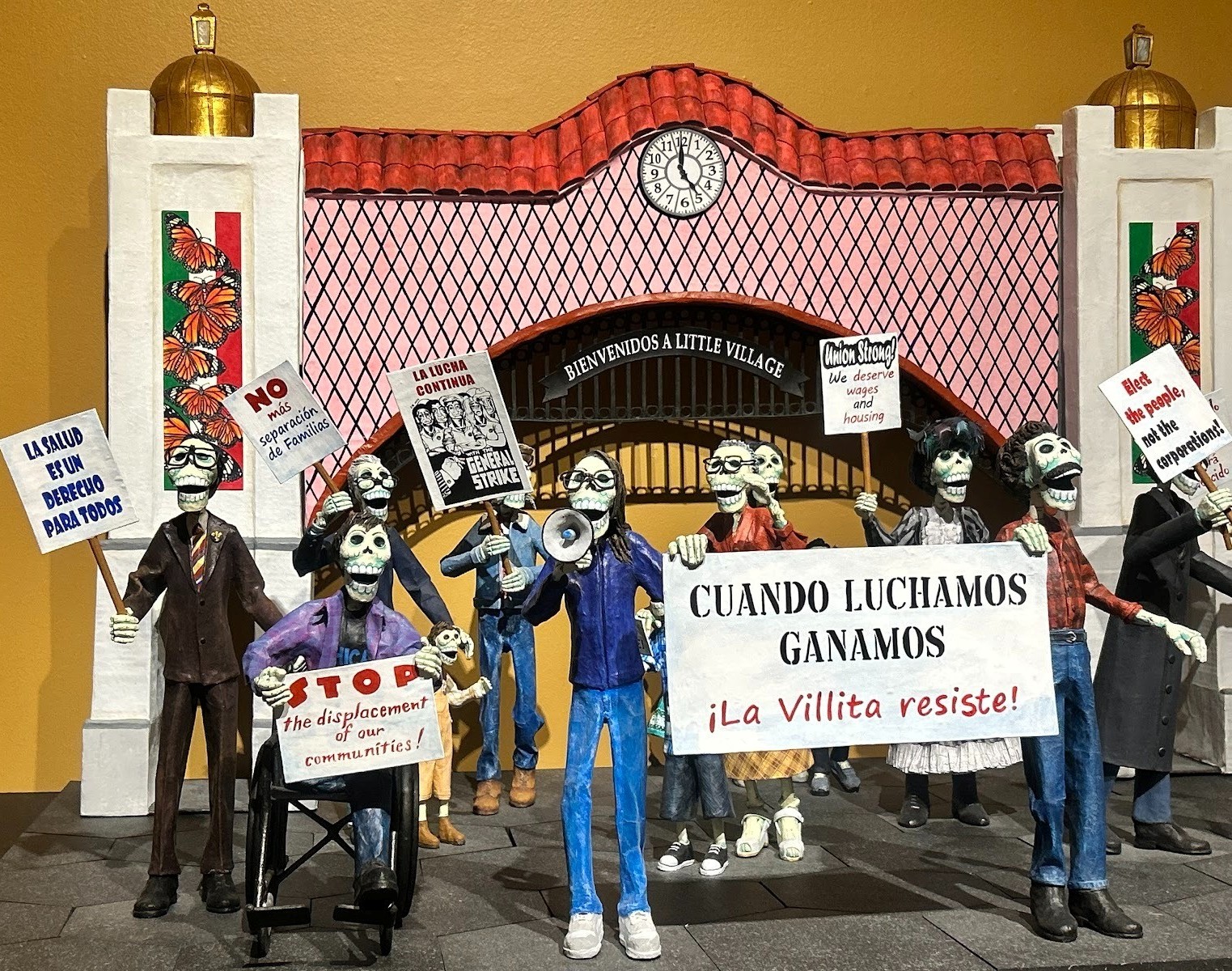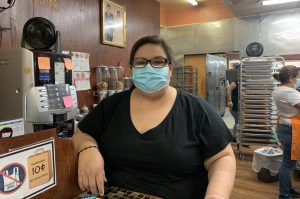BORN IN SAN JUAN, Puerto Rico, Carmelo Esterrich is a Professor of Humanities and Cultural Studies at Columbia College Chicago. “I am a man, a white Puerto Rican,” says the Downers Grove resident. Esterrich, 57, identifies himself as Puerto Rican but doesn’t mind using the word Latino. He came to the United States in 1983 to attend college at Penn State and later moved to Chicago in 1987.
What do you think of the term Latinx to identify people of Latin American or Spanish background?
I think is a useful term in the United States in English. There’s been this huge controversy about how do you say Latinx in Spanish, like, “Do you say Latinx?” which doesn’t mean anything at all. I think a lot of people use it in the U.S. because they want to have a term that is not gendered, that doesn’t have the O or the A at the end of the word.
It’s interesting because the term originally started in the in the LGBTQ community. It was a way of taking away the gender ending of the word, putting an X in it, and that way, it doesn’t really matter what your gender is. You’re part of the Latinx community, end of story. In English, that works, but translating into Spanish, it just doesn’t work. So inside the United States, people use it. I find it useful. I like using it, when I’m trying to talk about the community without ascribing a gender to it. That’s why I like the X. And I do use it.
I would not use it for Latin Americans in Latin America. I would use it for Latin Americans living in the US. Because in those countries, they speak Spanish, not English. I would just call them Latin Americans, rather than Latinx.
There is a way in Spanish that some people are starting to use. Instead of saying Latino or Latina, they’re using an E for saying Latine. So that is sort of the equivalent of Latinx. Because the E at the end in an English word just sounds like you’re saying Latin with an E at the end. It doesn’t really translate.
I like using Latinx when I’m talking about Latinos in the US. But people in Latin America, I wouldn’t, and I would not use Latino with Spaniards. They’re Europeans, they’re Hispanics, they’re Spanish, they’re Spaniards. But I wouldn’t use or call them, Latinos, or Latinas, or Latinx. I would not use it for Europeans. Because to me, Latino is an abbreviation of Latin American, and a Spanish is not from Latin America. So that’s the way I use it.
Do you feel like Latinx is just an excuse for corporations to lump all Latino cultures together?
I’m going to say they’ve done it before with the word Latino and the word Hispanic. So I don’t think that Latinx is necessarily a corporate ploy. In many ways, for many years, the word Latino was the sort of generalizing term of anybody who speaks Spanish in the US, and just putting them in the sort of big pocket of Latino instead of saying Puerto Rican, or Mexican, or Guatemalan or Salvador, and Peruvian, or Argentine, Uruguayan. It’s not new and so I don’t know.
I don’t see it as a different way of sort of generically, lumping us into a group. I think that’s been done since the word Hispanic in the 1970s. Then later on the word Latino was this sort of generic term as well. But it’s really interesting because the Latino communities use the word Latino; it’s not that only white America calls us Latinos.
Yes, it can be used as a commercial ploy. No, I don’t think it’s an exclusive use. The term was not created by corporate America. The term was created by queer kids and lesbians and gays to take out the gender out of it. How other people use it, that’s a different story. Can it be exploited? Absolutely. Corporations will exploit anything. But I don’t think it’s a deliberate ploy. Actually, corporations are actually a little shy about using Latinx because it’s not conservative. Because when you put Latinx then you’re like accepting gays and lesbians and queers and transgender persons into the community and the Latino community. Some parts of the Latino community feel very reticent to include that part. So there are lots of corporations that are not using it. Because they feel like they would sort of push aside the conservative population of the Latinos because Latinx has sort of a modern progressive, forward-looking term to it in a way that Hispanic has very conservative [tone.]
You know, the government calls it the Hispanic Heritage Month. They don’t call it the Latino Heritage Month; they don’t call it the Latinx Heritage Month. And they’re using the word Hispanic, because that is the safest word. That’s the word that nobody is going to object too much. [With] Latinx there is lots of people that would object. So there are lots of corporations that are not using it on purpose. Because they don’t want to push away the conservative audiences, which are very large, although Roman Catholics and all their very conservative communities are not going to accept Latinx.
Has your experience as a Latinx person isolated you to the way you grew up, or have you been able to branch out culturally?
Because I didn’t grow up in the US, I didn’t use the word Latino growing up. The term Latinx sort of includes me into a more progressive community. I don’t like the word Hispanic. It feels just very stodgy and old fashioned. When people call me Hispanic, I always feel like, “Oh, don’t call me that. Latino, I’m totally okay, … I’m part of that community.” I think because I’m in an older generation. I don’t know that the term has sort of opened doors or created a different sense of how I relate to others socially. But it certainly makes me feel part of a progressive community, part of our forward-looking community. And I like that very much.
How have these labels changed from where you were born and now living in the U.S?
In Puerto Rico, we do use the word Hispano. The word in Spanish is Hispano for anybody who speaks Spanish. So an Argentine is Hispano or a Spaniard from Spain is Hispano, because they speak Spanish. In this country, there is this sort of notion of Hispanic is a sort of lumping all of Latin America. At the beginning, people from Brazil were called Hispanics, and Brazilians speak Portuguese. They were really upset that they used that term. Now, people are much more aware of Brazil, and so they don’t use the word Hispanic for it. Moving to this country, the word Latino was new to me. Because Latino, I would always use the term Latinoamericano. For talking about somebody from Latin America, I wouldn’t call them Latinos. But in the U.S., that’s something that I have gotten used to by living in this country, of hearing people using the term to talk about the community of people from Latin America that live in the United States.
There are some people that want to differentiate between people that came from Latin America, and people that were born in the US from Latin American parents. So there are some people that will use Latino only for the ones who were born here. If a Colombian family moves to the U.S., the parents are going to be Colombians. And the children will be Colombians, but they will eventually identify themselves as Latinos, because they’re part of this larger community of Spanish speakers in the U.S., and so there are some people that make that difference. If you’re from Latin America, you’re not Latino. But if you’re a descendant from Latin Americans you say you are Latino, I don’t use it that way. But there are some people that do. In Puerto Rico, nobody uses Latinx. Latinx doesn’t exist. But we’re using the “e,” like we’re saying amigue, amigues instead of amigos and amigas. But, if a word has an “o” or an “a,” a lot of people are using the “e,” and it’s been rejected by the Academy of Language in Spain. They said, “No, that’s not Spanish.” But people are using it anyway.
They actually had a meeting. All these old white Spanish men sat down in the room, like, “Should we allow this to happen in Spanish?” And they said, “No”. As if people are going to stop, because people are using it anyway. So very funny. Actually, there might be a woman or two in that group. Now, I think there might be a couple of very conservative women that are in the same office in Madrid that make decisions about the language. It’s called the Royal Academy of Spain, the Braille Academy of the Spanish language, La Real Academia de la Lengua Española that’s been around for hundreds of years. They sort of police the language. I remember when I was a kid, there was in the news that they allowed the word baseball. Like “beisbol,” like the rules of baseball, but spelled in Spanish. They said, “yeah, we can allow that.” Because that is an American game and it’s an English word, and we can use it. So that’s the same group that said, nope, that doesn’t work.
“In Puerto Rico, nobody uses Latinx. Latinx doesn’t exist. But we’re using the ‘e,’ like we’re saying amigue, amigues, instead of amigos and amigas.”
How do you navigate U.S. culture? What type of culture shock have you experienced?
Puerto Ricans are American citizens. Legally and officially, we’re Americans. Culturally, we’re so different. My moving from Puerto Rico to the U.S., when I came here to go to college, was just very, very difficult. I had no friends for a year. I just didn’t know how to make friends. Because in Puerto Rico, you make friends with anybody. You meet somebody, and five minutes later, you are friends. By the end, you’re kissing each other goodbye, because you are friends. And here there’s distance.
I didn’t know how to read that. So I thought, okay, they don’t like me. I would just pull away because they were not being friendly with me. Friendly, the Puerto Rican way. I just kept assuming that nobody wanted to be my friend. I just sort of distanced myself for a whole year.
My first year in college was really difficult. I had a nervous breakdown. I cried for a whole weekend, and my hands were shaking. I couldn’t hold a fork, couldn’t write or read. I was just a complete mess that was so lonely. In my first year, I didn’t know anybody, not one person. It was just really difficult. It really was a culture shock. Then eventually, I sort of started figuring it out. But this whole idea of the distance… in Puerto Rico, the private space is very small. I would be very close to people and people would back away, because Americans need a little more space. But I didn’t know that. I was reading that as a rejection. I was reading that as some sort of, “They do not want to be my friends because they are only 12 inches away from me rather than two inches away from me.” That was very, very difficult.
The language barrier was also an issue. But, I sort of expected that one. I didn’t expect how difficult it was to make friends at the beginning. That was really hard. I’m an extrovert. I love being with people. I don’t even want to think about it. It was pretty terrible. After the first year, it was better. But the first year was tough.
Do you speak Spanish? How do you view Spanish as an attribute of your identity? How important it is?
Spanish is my first language. Spanish is part of my culture. Spanish is part of my personality. I have lived in this country long enough that English feels very natural. But, I rather speak Spanish than English. I just feel when I’m really tired. I wish I could just switch back to Spanish. When I’m with Spanish speaking people, I do but when I’m not, I just can’t do it. It’s a huge part of my experience. I’m very glad that I live in a country where so many people speak Spanish. Because I am able to communicate in my language with other people.
When Elio [Leturia] and I talk, we always talk in Spanish, we don’t care who’s around. There’s a colleague that I have in my department. She’s from Spain, she teaches American history. She’s like an Americanist, and every time we meet, we just feel so weird. If we have to speak English, we’ll speak English. If there are other people that need to listen to our conversation. But if we’re talking to each other, Spanish. Spanish is a part of me. Yeah, it’s big. Language is really big for me.
Would you say your culture is “better” than someone else’s who is of a different ethnicity or country?
No, it’s just different. One of the things that I have really enjoyed about living in the United States is encountering so many different cultures. In Puerto Rico, when I was growing up, it was just Puerto Ricans. A few Dominicans, a few Cubans, I had never met a Mexican. I didn’t have Mexican food until I moved to this country. We have Taco Bell, but that doesn’t count. We had Chinese food. And that’s it. Everything else was Puerto Rican food. What we ate in my house was Puerto Rican food every day. It was so fascinating moving to a country where I could say, let’s see what Ethiopian food is like.
I have friends from South Africa, Taiwan, Finland, Greece, Egypt, and in Puerto Rico, it just wouldn’t have happened because they just don’t exist. Now, there’s a little more of a migration. There are other people in the island. But when I was growing up, it was mostly Puerto Ricans. So, I enjoy the difference of the other cultures. I don’t think of a hierarchy.
In Latin America, there is sort of like Mexican culture is better than Guatemala. Argentine culture is the best. Colombians are the ones that speak the best Spanish, period; they call them the grammar police. Because they know every single little, tiny rule. So those things exist. I mean, that question comes from somewhere. It comes from this notion of certain cultures are more civilized, or they’re more advanced than others. I think living in this country has proven that that’s not the case. They’re bastards everywhere. They’re good people everywhere. So I don’t think of it in that term. I don’t think of it hierarchically. I really don’t.
Does cultural appropriation bother you?
The answer for me is, it depends. There are ways in which you take someone else’s culture and do something very interesting with it. Let me just give you an example. I find it fascinating how in rock and pop music, how certain rhythms are sort of absorbed into the music. So it’s really fun hearing a Mexican performer using tangos from Argentina, or a Cuban singer using Ranchera music as part of a larger tradition. Now, when Justin Bieber is using Reggaetón in his songs, that’s different. That’s exploitation, that’s sort of like, this rhythm is popular, so I’m going to use that rhythm. Even though Justin Bieber as a Canadian has nothing to do with reggaetón music. That is different.
I think the issue that I have with the question that you’re asking me, is that there are different kinds of appropriation. There are a lot of people that just hear the word “appropriation,” and they automatically think that it’s a negative term. It’s more complex than that. There are ways in which you can dialogue with other cultures without necessarily appropriating them in the way that people think of appropriation. There’s such a thing as misappropriation, when you appropriate something incorrectly or out of ignorance, more than anything else. But, I have my battles with that word appropriation, because I think some things are really interesting. In other cases, it’s just exploitation. So using something you know, in Sex in the City on HBO, uses salsa [music] at the beginning of the show, when it’s for white girls, and there are no Latinos around in that show, that’s weird, really weird. But they use it because New York has that Puerto Rican feel, and Puerto Rican culture is salsa. So, they grab you with the music, but they don’t deliver it. There’s never any sort of Latin, or Latino, or even Latinx feel to the show. It just doesn’t exist. It’s just there for decoration. Sort of a tropical flavor to Carrie Bradshaw, who is not by any stretch of the imagination, connected to Latinidad in any way and so that’s problematic. But not all. I just don’t use the word appropriation the way a lot of people use it.





















Be First to Comment